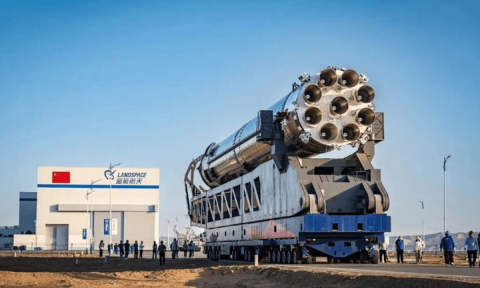LandSpace’s Test Flight with Zhuque-2E Y3 Launch Vehicle Meets Failure at Early Stage
Chinese commercial rocket startup LandSpace Technology has encountered a significant test failure with its methane-powered Zhuque-2E Y3 launch vehicle, marking a notable setback after its pioneering achievements in methane-fueled rocketry. While LandSpace made international headlines in 2023 as the first entity to successfully deploy a methane-liquid oxygen rocket into orbit, this latest incident underscores the technical and competitive hurdles in China’s rapidly evolving commercial space sector. Setbacks notwithstanding, LandSpace appears resolute in pushing ahead with breakthroughs in reusable rocket technology and cleaner propellant adoption, maintaining its position at the frontline of the global space launch industry.
LandSpace’s Test Flight Incident: A Moment of Reckoning
On Friday morning, LandSpace Technology—a trailblazer in China’s burgeoning space industry—experienced a high-profile setback when its Zhuque-2E Y3 rocket suffered an “anomaly” shortly after liftoff at a commercial launch facility in northwestern China. The Beijing-headquartered company announced the incident publicly via WeChat, noting that it had commenced a detailed investigation into the failure’s root cause.
While the company withheld specific technical details, the gravity of the situation is clear: the stalled test flight interrupts a streak of technical successes and rattles investor confidence, at least temporarily, in China’s commercial rocket development landscape.
A Pioneer in Methane-Fueled Rockets Faces Headwinds
LandSpace’s mishap comes in contrast to the company’s earlier achievements. In May, its Zhuque-2E Y2 rocket variant executed a successful test flight, highlighting steady progress in methane-based launch vehicles. In fact, LandSpace rocketed to global attention in July 2023 when its Zhuque-2 rocket reached orbit—the first ever methane-liquid oxygen rocket to do so, outpacing industry heavyweights such as SpaceX and Blue Origin in this particular realm of clean-fuel propulsion.
This technological coup established LandSpace as a noted innovator, with methane-laced propellants celebrated for their cleaner emission profiles, operational safety, and lower costs compared to conventional hydrocarbons like RP-1.
Methane Propulsion: The Strategic Edge and Its Complexities
Momentum continues to build around methane-powered rocketry, widely touted as a game-changer for both satellite deployment and surge in reusable booster architectures. Methane offers distinct advantages: it produces fewer pollutants than traditional fuels, allows engines to be refurbished between flights, and supports long-term reusability paradigms critical for next-generation space programs.
Despite these strengths, methane rocketry demands new expertise and rugged testing regimens. The latest failure reminds industry participants that, while the fuel’s promise remains strong, delivering reliable methane-powered launch systems is a technological hurdle, not a foregone conclusion.
Competition Heats Up in China’s Commercial Launch Sector
LandSpace’s stumble comes at a critical juncture as the Chinese commercial space scene grows increasingly crowded and ambitious. The sector has witnessed an influx of capital, policy support, and entrepreneurial energy, with several enterprises vying for ascendance in both the satellite and launch markets.
Forging ahead, LandSpace has signaled no intent to pull back, instead reaffirming its mission to develop and commercialize both liquid oxygen and methane propulsion platforms. The setback is not derailing broader plans, notably the introduction of the company’s flagship Zhuque-3 rocket.
Last month, LandSpace completed a successful 45-second hot fire test of the Zhuque-3’s first stage, reaffirming technological progress. The larger, reusable Zhuque-3 is slated for its maiden orbital launch in Q4 2025, with expectations of boosting China’s competitive edge in reusable, clean-fuel launch systems.
Strategic Takeaways and What Lies Ahead
For market observers and investors, the latest test failure is a reminder of the risks inherent in next-generation rocket development—where each step forward is shadowed by engineering challenges. Yet for LandSpace, its track record and continued investment in methane rocket innovation suggest the company is far from out of the race.
With global interest mounting in environmentally favorable launch platforms and reusability, LandSpace’s pursuit of scalable, methane-based rockets could define the next decade of commercial spaceflight. China’s mixed ecosystem of government-backed and private space startups ensures a relentless push for domestic and international market share.
Success in future launches, coupled with robust risk-management and engineering rigor, will be key for LandSpace to not only recover from this setback, but to strengthen its role as a technical leader in China and abroad.
